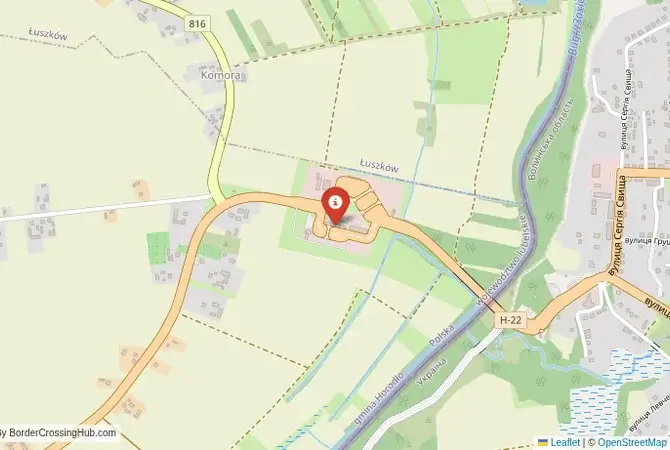
Approximate Border Location
Wait Times
15-60 min for pedestrians/vehicles
Operating Hours
Open 6:00 AM – 10:00 PM
Crossing Types
Pedestrians, vehicles
Border Type
Land crossing via road
Peak Times
Mornings (7-10 AM)
Daily Crossings
~5000 travelers/vehicles
Currency Exchange
Limited near Ustyluh (UAH, PLN)
Safety Information
Rural, minimal crime
Languages Spoken
Ukrainian/Polish
Accessibility Features
Ramps, assistance
About Ustyluh & Zosyn
A Local Crossing with a Rich History
Important Note for Travelers: Due to the ongoing war in Ukraine, all border crossings with Poland are under significant strain. Wait times can be long and unpredictable, even at smaller crossings. It is essential to consult official government sources and live queue data for the most up-to-date information on its operational status before planning any travel.
The border crossing connecting the Ukrainian town of Ustyluh with the Polish village of Zosyn is a smaller, more local checkpoint that offers an alternative to the massive, congested corridors like Yahodyn-Dorohusk. This is a crossing with a distinctly regional character, serving the communities of the historic Volhynia region and providing a more intimate border experience. It is situated in a landscape of rolling hills and agricultural fields, on a bridge over the Bug River, which marks the border. To cross here is to take a journey through a land with a deep, complex, and often tragic shared history, a passage that feels more connected to the local towns than to the grand capitals.
Operational Details
This checkpoint connects Ukraine’s Volyn Oblast with Poland’s Lublin Voivodeship. It is an international crossing, but with a key restriction: it is generally limited to passenger cars and small vans with a total weight of up to 3.5 tonnes. This exclusion of heavy freight traffic is what preserves its character as a quieter, more manageable crossing. It typically operates 24/7, but its primary value is as a release valve for the main crossing at Yahodyn, especially for travelers whose destinations are in the immediate border region.
Before Crossing
Crossing borders gets messy sometimes, think political flare-ups or gates shutting fast. Good travel insurance is a must for handling doctor visits, trip disruptions, or security scares. Don’t get caught unprepared. To find a policy that’s got your back, check out reliable plans today for peace of mind.
A History of Volhynia
The history of this region is the history of Volhynia, a historic land that has been part of Kievan Rus’, the Kingdom of Poland, the Polish-Lithuanian Commonwealth, the Russian Empire, and interwar Poland. It has long been a multicultural area, with Ukrainian, Polish, and Jewish communities living side-by-side. This shared existence was shattered during World War II by the Nazi Holocaust and the brutal ethnic conflicts between Poles and Ukrainians. The town of Ustyluh itself has a notable cultural history; it was the home of the composer Igor Stravinsky for several years before World War I, and a museum is dedicated to him there. The border drawn on the Bug River after the war formalized a painful separation. This crossing is one of the small bridges that helps to reconnect this historically intertwined land.
Border Crossing Procedure
The border crossing procedure is a standard two-part process for entering the EU and the Schengen Area, but on a smaller scale than at the major crossings. You will first complete exit formalities at the Ukrainian checkpoint at Ustyluh. After crossing the bridge over the Bug River, you will arrive at the Polish checkpoint at Zosyn for a full EU entry inspection by the Polish Border Guard (Straż Graniczna) and Customs Service. You will need a valid passport, vehicle registration, and international insurance (Green Card). Because the crossing is limited to smaller vehicles, the process can often be significantly faster than at Yahodyn, but queues can still develop, especially when the larger crossings are blocked or heavily congested.
The Surrounding Region
The surrounding area is rich in history. On the Ukrainian side, Ustyluh, in addition to its Stravinsky museum, is near the ancient city of Volodymyr (formerly Volodymyr-Volynskyi), one of the most important historical capitals of the region, with beautiful medieval churches. On the Polish side, the crossing is near the town of Hrubieszów, another historic border town. The region is largely agricultural. For travelers, this crossing is a good choice if you are exploring the historic cities of Volhynia or heading towards the Polish city of Zamość, a stunning UNESCO World Heritage site renowned for its unique Renaissance architecture.
Practical Travel Information
Practical planning is key. The weight restriction is the most important factor to be aware of. The roads leading to the crossing are regional and can be of variable quality, particularly on the Ukrainian side. The official currencies are the Ukrainian Hryvnia (UAH) and the Polish Złoty (PLN). Services at the border are limited, so it is best to plan for fuel and currency exchange in the larger towns of Volodymyr or Hrubieszów. You will need the Polish `e-TOLL` system if you are driving a vehicle over 3.5 tonnes, though such vehicles are generally not permitted here.
Final Considerations
The Ustyluh–Zosyn border crossing is a valuable alternative for passenger car travel between Ukraine and Poland. It offers a potentially faster and less stressful experience than the major freight corridors. It is a journey through a region with a deep and poignant history, a passage that connects two nations at a more human scale. In the current climate, its role as a secondary artery has become even more important, providing a crucial link for families, aid workers, and all those whose journeys are part of the ongoing story of Ukrainian resilience and European solidarity.
No reviews yet.
